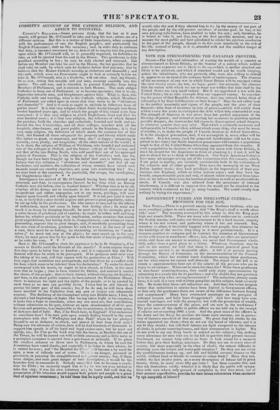GOVERNMENT CLERKS AND MERCANTILE CLERKS— PROVISION FOR OLD AGE, NEW
TIMES—There is a proverb among our Northern brethren, who are most excellent judges in such matters, that " the King's chaff is worth other folks' corn." The meaning conveyed by this adage is, that the King pays high and exacts little. There are many who would endeavour to eontrovert the Scotch maxim, and make out Government to be a hard master, reaping where it has not sowed, and gathering where it has not strewed. But, somehow or other, it invariably happens with such people, that whatever be the hardships of the service they cling to it most pertinaciously. It is a common practice to compare and to contrast the situation of Government clerics with those in merchants' oflices ; but, though we often see merchants' clerks shift from one master to another, we never find Government clerks shift, unless from a gciod place to a better. Whatever, therefore, may be said on the matter, we hold that there is abundant practical proof that Government service is no despicable affair. A bill is at present moving through the House of Commons, on the .recommendation of the Finance Committee, which has excited much displeasure among those gentlemen, yet for what reason we cannot well discover. The object of the bill is to create a superannuation fund out of the salaries of the persons who are to enjoy its advantages. W hat can be more fair than this? Were these gentlemen in merchants' counting-houses, they could only enjoy superannuation by submitting to a yearly tax for its purchase ; and why should they not purchase it in the same way when serving Government ? The reductions already made have, it is said, in a very well written pamphlet on this subject, been severely felt. No doubt they have—all reductions are. And does the writer imagine either that reductions in salaries have been limited to Government offices, or that only the gentlemen there are aware of the difference between luxury and competence ? Many have contracted marriages on the prospect of enlarged income, and have been disappointed ! And how many have con- tracted marriages, not wills the prospect, but with the possession of wealth, since the commencement of the peace, and are now in the workhouse ? The great mass of the clerks in public offices we are told are in the receipt of salaries not exceeding 300/. a year. And the great mass of the officers in the Army and the Navy, for services ten times more onerous, are in posses- sion of incomes one-third of that amount. We grant that the clerks do the duties appointed for them—they do not eat the bread of idleness, and it is not fit they should ; but still their labours are light compared to the labours of clerks in private counting-houses, and their remuneration is higher. We do not wish to say any thing harsh or unkind on this subject ; but, making every allowance for men who see in the bill in question their present income threatened, we cannot help calling on them to look round for a moment before they give their feelings utterance. Do they not see in every class of society, but more especially in the class of clerks, the utmost difficulty in obtaining even the lowest and worst-paid situation ? Do they not see every day establishments broken up, and old and faithful servants thrown on the world, without fund or friends to succour or solace them'? Have they not, within the last twelve years, seen every description of labour fall in price twenty, thirty, in many cases fifty per cent.? Let them consider this, and then ask themselves coolly, whether it is likely that the public will sympa- thise with men whose only ground of complaint is, that they must, out of their present superfluities, provide for their !inure subsistence when rendered by age incapable of labour?


















 Previous page
Previous page